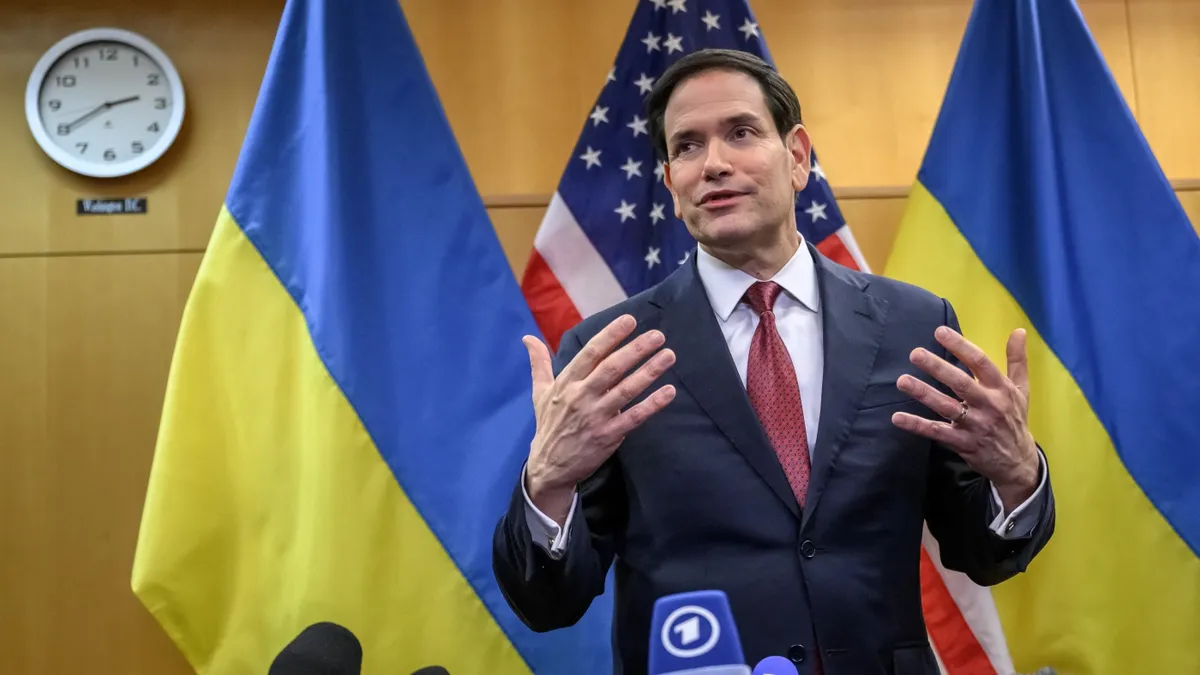
Good morning! You're reading the Up First newsletter, your go-to source for the latest news. Subscribe here to receive it directly in your inbox, and don’t forget to listen to the Up First podcast for all the news you need to kickstart your day.
Secretary of State Marco Rubio has expressed optimism regarding the potential for reaching an agreement between Russia and Ukraine. In a significant development, U.S. and Ukrainian officials convened in Geneva yesterday to deliberate on President Trump's peace plan. This plan, which comprises 28 points, has a looming deadline of Thursday for Ukraine's agreement.
Despite the discussions, skepticism abounds among European leaders who feel the plan requires further refinement. NPR's Rob Schmitz reports that European leaders feel sidelined, as they were not consulted during the drafting of the peace plan, despite having participated in some Geneva meetings. This oversight is particularly alarming for these leaders, given that the plan proposes substantial commitments from them, including billions of dollars allocated for Ukraine's reconstruction and a framework for emergency response if the agreement is breached.
As of now, the Kremlin has not commented on the Geneva talks. Separate discussions between the U.S. and Russia are also anticipated.
In another significant political development, Rep. Marjorie Taylor Greene, a Republican from Georgia, unexpectedly announced her resignation from Congress, effective January 5. Greene, who initially gained prominence as a staunch defender of Trump, has recently become one of his vocal critics, alleging he has strayed from his agenda.
According to NPR's Stephen Fowler, Greene believes her political stance remains unchanged, asserting that it is Trump and other party members who have diverged from the principles of America First conservatism. Fowler emphasizes the importance of recognizing that Trump is not a traditional conservative, and his return to office was contingent upon rallying diverse groups under the America First ideology, which has evolved in its interpretation.
Over the weekend, tensions escalated as both Israel and Hamas accused each other of violating the ongoing ceasefire agreement in Gaza, which has held for over six weeks. Notably, Israel conducted airstrikes in Beirut, Lebanon, marking its first strike there since June and resulting in the death of a Hezbollah commander. This action has raised concerns about the stability of the ceasefire in the region.
NPR's Kat Lonsdorf notes that while the initial phase of the ceasefire is complete, the next steps involve establishing an International Stabilization Force in Gaza. However, many questions linger about the composition and training of this force. Despite the ongoing violence and accusations of violations, the ceasefire agreement remains intact, preventing a full return to war.
The Cost of Living series, "The Price We Pay," delves into the factors driving price increases and how families are adapting following years of persistent inflation. Over the last three decades, the average tuition for both public and private four-year colleges has effectively doubled when adjusted for inflation. Although many families benefit from financial or merit aid, making the net price lower than the sticker price, this reduced cost still surpasses what it was two decades ago.
Several factors contribute to the escalating costs of higher education. The reduction in state funding for public institutions has led colleges to raise tuition to compensate for budget cuts. Furthermore, the perception of prestige associated with high tuition fees attracts wealthier families, with approximately 40% of Harvard's incoming class paying the full tuition.
Additionally, college prices fluctuate widely across institutions and states, often leaving families unaware of the total costs until the conclusion of the admissions process, complicating their ability to make informed comparisons.
This week, the series will also explore the costs associated with holiday shopping. Stay informed about the latest developments and share your experience with rising prices by filling out this form to connect with NPR.
In our Living Better series, we examine what it takes to maintain health in America. It is estimated that nearly half of all women will experience hair loss at some point in their lives. While various scientifically supported treatments exist, not all remedies work for every individual or type of hair loss.
For those experiencing hair thinning, it's essential to understand that hair sheds in a staggered pattern, meaning that a clump of hair in the drain doesn’t necessarily indicate impending baldness. The most prevalent cause of permanent hair loss, particularly in women, is androgenetic alopecia, which typically manifests at the crown of the head. If you notice your part widening, it could be a sign of this condition.
For individuals uncertain about their specific type of hair loss, an in-person consultation with a dermatologist is often advisable. However, telehealth options can provide a viable alternative when in-person appointments are delayed.
In other news, Tatiana Schlossberg, granddaughter of the late President John F. Kennedy, has been diagnosed with a rare and terminal form of cancer known as acute myeloid leukemia. She shared her experience in a poignant essay in The New Yorker.
NPR's Books We Love returns with an extensive selection of over 380 titles from this year, curated by NPR staff and trusted critics. From cookbooks to thrilling mysteries, this list is perfect for your next reading adventure.
Lastly, a homeless advocacy organization within the Cincinnati Public School System is set to support over 4,000 homeless students and their families by providing a designated lot for them to sleep in their cars while they seek housing. This initiative is set to launch in March 2026.
This newsletter was edited by Suzanne Nuyen.